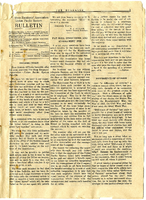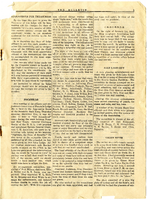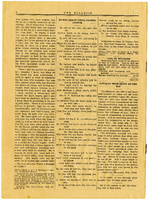Search the Special Collections and Archives Portal
Search Results
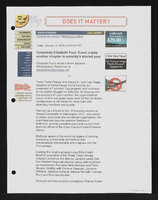
Alpha Kappa Alpha Sorority, Theta Theta Omega Chapter Founders' Day article and committee report
Date
Archival Collection
Description
From the Alpha Kappa Alpha Sorority, Incorporated, Theta Theta Omega Chapter Records (MS-01014) -- Chapter records file.
Text
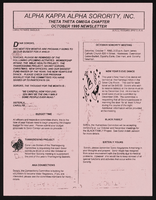
Alpha Kappa Alpha Sorority, Theta Theta Omega Chapter newsletter
Date
Archival Collection
Description
From the Alpha Kappa Alpha Sorority, Incorporated, Theta Theta Omega Chapter Records (MS-01014) -- Chapter records file.
Text

Transcript of interview with Mark Hall-Patton by Claytee White and Stefani Evans, August 25, 2016
Date
Archival Collection
Description
Mark Hall-Patton, administrator of Clark County Museums and since 2008 a frequent guest on the popular cable television show Pawn Stars, was born in 1954 in San Diego, California. His mother was a registered nurse and his father served in the United States Navy. From early childhood, Mark’s interest in history and museums shaped his path in life. After graduating high school in Santa Ana, California, he earned his Bachelor’s degree in history at nearby University of California, Irvine. Degree in hand, Mark worked for Bowers Museum in Santa Ana and founded the Anaheim Museum in 1984. He moved to Las Vegas, Nevada in 1993 to create the Howard W. Cannon Aviation Museum in McCarran International Airport. By 2008, Mark had become administrator over all Clark County museums. In this interview, he explains the various ways his involvement with the popular Pawn Stars program has turned “the museum guy” into a brand, introduced production companies to the value of filming in Las Vegas, increased Clark County museum visits and donations, and raised popular awareness of the academic fields of history and museum studies.
Text

Maria Casas interview, June 12, 2019: transcript
Date
Archival Collection
Description
Interviewed by Maribel Estrada Calderón. Farmersville is described as a small town between, Exeter and Visalia, California populated by Mexican American farm workers. It is in this small town, where UNLV History Professor Maria Raquél Casas spent her childhood raised along with her sisters and brothers. In her interview, Dr. Casas describes how growing up in this small town with her traditional Mexican family influenced the person she is today. While working alongside her family in the fields, Dr. Casas decided that she would strive to obtain an education. Through hard work and constant support from her sister, Dr. Casas attended Fresno State, where she discovered her love for history. Upon completing her undergraduate program, Dr. Casas made the decision to further her education by pursuing a master's at Cornell University. At Cornell, she faced discouraging professors who believed she would not be able to complete the master's program let alone pursue a PhD program. Despite these demoralizing professors, Dr. Casas completed her program and was admitted into University of California Santa Barbara's history program. Dr. Casas never forgot her roots or the significance of her presence in the majority white academic spaces she attended during her academic journey. When she arrived at UNLV, she continued to strive for more Latino representation in both the student population and in the school faculty. During her tenure at UNLV, Dr. Casas has served as an advisor for multiple Latino student organizations including MEChA and SoL. Dr. Casas has witnessed much progress in Latino representation at UNLV, but she believes there is still much work left to be accomplished.
Text


